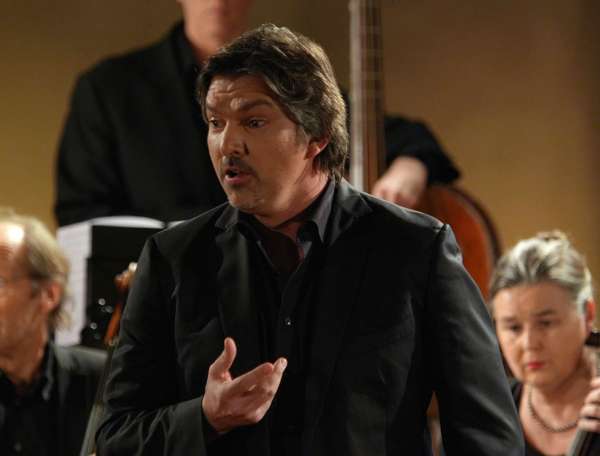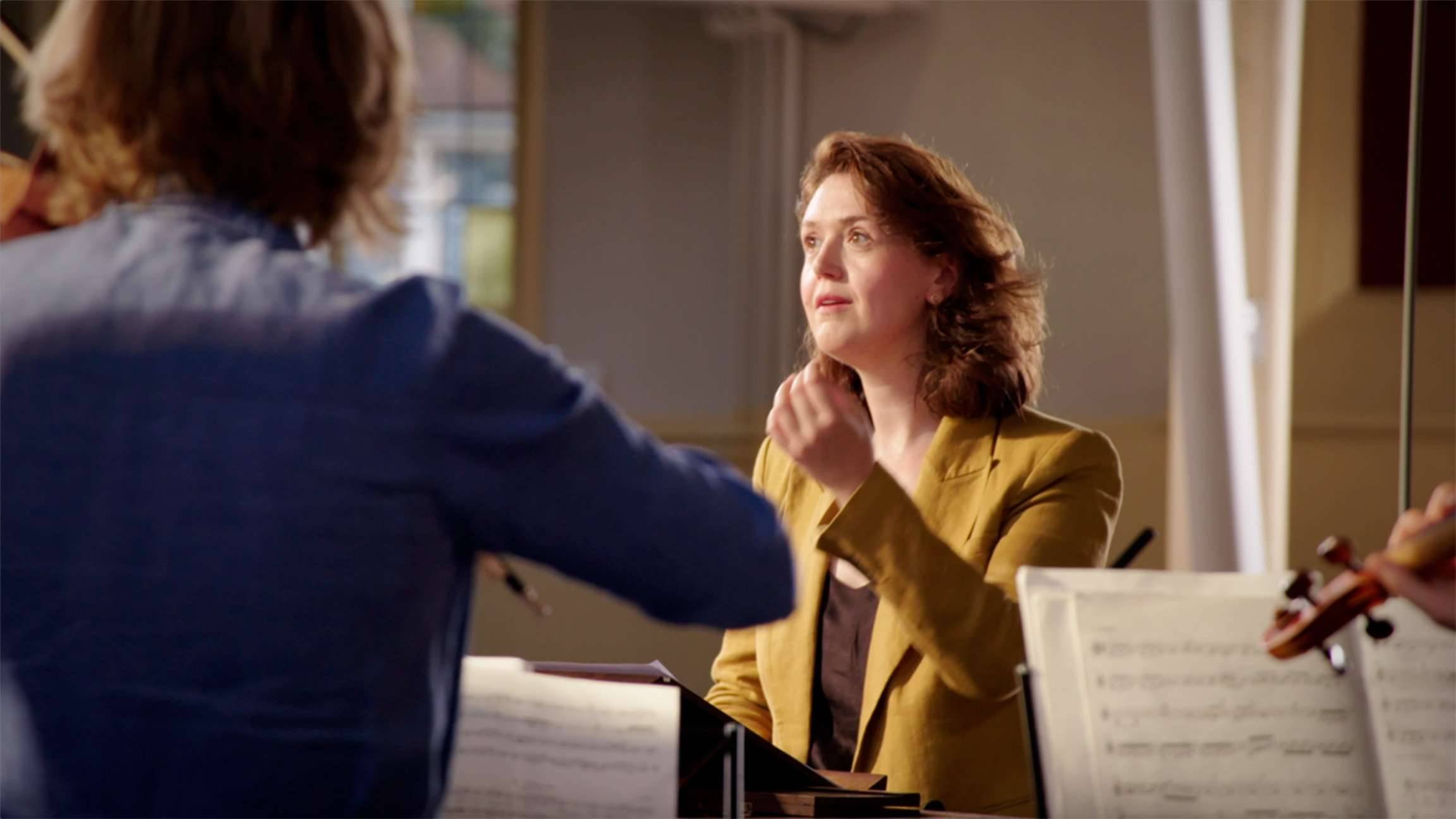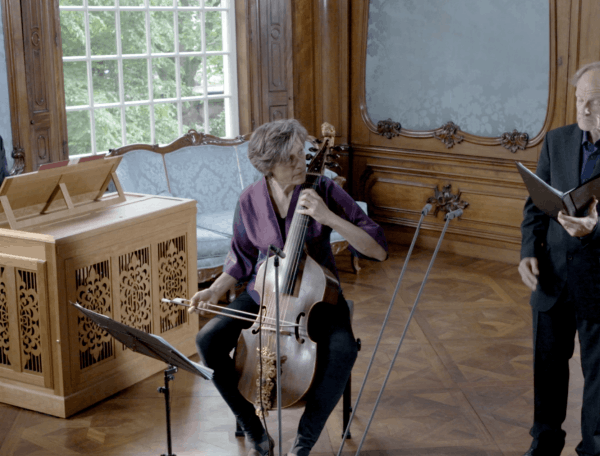

Komm, du süẞe Todesstunde
BWV 161 performed by the Netherlands Bach Society
conducted by Johanna Soller
Oude Kerk Charlois, Rotterdam
Behind the music
A pocket-sized heaven
One of Bach’s most popular cantatas sings of a serene longing for death
Komm du süße Todesstunde, BWV 161, is probably one of Bach’s most refined cantatas and certainly one of his most popular. Bach wrote the piece in his early thirties, when he was court organist in Weimar.
As in several of Bach’s cantatas, the text revolves around death. The cantata’s lesson is fairly literal: I hope to die an early death, so that I might embrace Jesus. For many listeners today, this is a surprising idea, if not a morbid one. But in Bach’s time, it was a familiar theme. Why roam this false, imperfect world if eternity awaits you?
Bach’s heavenly music, however, makes it easy to identify with the Lutheran longing for death, as Bach uses every musical means available to sketch a picture of what awaits us after death. In the title aria, the alto gives voice to a controlled, serene longing to be with Jesus, accompanied by two recorders and a subdued string ensemble. After a few minutes, another melody insinuates itself between all the writhing parts, when the organ plays the chorale ‘Herzlich tut mich verlangen’, in the same way as the well-known ‘O Haupt voll Blut und Wunden‘ from the St Matthew Passion. Interweaving a chorale like this was a musical technique that Bach was to develop further later on, culminating in the opening chorus of the St Matthew Passion.
Then the tenor takes over the baton, with a heavier, more melancholy aria that alternates between minor and major, lending ambiguity to the longing for death. In the following recitative for alto, the ensemble gleams and glows like a pocket-sized heaven. With an elegant, descending motif, the alto imagines death to be like falling asleep in the arms of Jesus. While the alto part lingers on a single note to the word ‘sleep’, the recorders repeat that descending motif and the harmony begins to transform. For a moment, it seems as if we are spiralling downwards with the recorder motifs, slowly but surely slipping away to another state of being. Another brilliant example of tone painting comes at the end of the aria, when we hear the bells tolling in the pizzicato strings.
Soon, however, we’re shaken awake by a cheerful, dancy movement. The recorders that were initially harbingers of the afterlife now twitter like birds in the morning. The soprano and bass also join in with the alto and tenor. The cantata closes with a chorale to the same melody we heard on the organ in the opening chorus, above which the recorders spin out an ornamented, apparently improvised line.
MWH4impact
This recording was initiated by social fund MWH4impact and organised specially for residents of Rotterdam-Zuid. MWH4impact aims to achieve social and cultural impact and joins the Netherlands Bach Society in their mission Bach for All. We thank MWH4impact for their generous support of this recording.
Supported by
Extra videos
Vocal texts
Original
1. Arie (Alt)
Komm, du süße Todesstunde,
da mein Geist Honig speist
aus des Löwens Munde.
Mache meinen Abschied süße,
säume nicht, letztes Licht,
daß ich meinen Heiland küsse.
[Herzlich tut mich verlangen
nach einem sel’gen End,
weil ich hie bin umfangen
mit Trübsal und Elend.
Ich hab Lust, abzuscheiden
von dieser bösen Welt,
sehn mich nach himml’schen Freuden.
O Jesu, komm nur bald!]
2. Rezitativ (Tenor)
Welt! deine Lust ist Last!
Dein Zucker ist mir als ein Gift verhaßt!
Dein Freudenlicht ist mein Komete,
und wo man deine Rosen bricht,
sind Dornen ohne Zahl
zu meiner Seele Qual!
Der blasse Tod ist meine Morgenröte,
mit solcher geht mir auf die Sonne
der Herrlichkeit und Himmelswonne.
Drum seufz ich recht von Herzensgrunde
nur nach der letzten Todesstunde!
Ich habe Lust, bei Christo bald zu weiden,
ich habe Lust, von dieser Welt zu scheiden.
3. Arie (Tenor)
Mein Verlangen ist,
den Heiland zu umfangen
und bei Christo bald zu sein.
Ob ich sterblich' Asch und Erde
durch den Tod zermalmet werde,
wird der Seele reiner Schein
dennoch gleich den Engeln prangen.
4. Rezitativ (Alt)
Der Schluß ist schon gemacht,
Welt, gute Nacht!
Und kann ich nur den Trost erwerben,
in Jesu Armen bald zu sterben;
er ist mein sanfter Schlaf.
Das kühle Grab wird mich mit Rosen dekken,
bis Jesus mich wird auferwekken,
bis er sein Schaf
führt auf die süße Himmelsweide,
dass mich der Tod von ihm nicht scheide.
So brich herein, du froher Todestag!
so schlage doch, du letzter Stundenschlag!
5. Chor
Wenn es meines Gottes Wille,
wünsch ich, daß des Leibes Last
heute noch die Erde fülle
und der Geist, des Leibes Gast,
mit Unsterblichkeit sich kleide
in der süßen Himmelsfreude.
Jesu, komm und nimm mich fort!
Dieses sei mein letztes Wort.
6. Choral
Der Leib zwar in der Erden
von Würmen wird verzehrt,
doch auferweckt soll werden,
durch Christum schön verklärt,
wird leuchten als die Sonne
und leben ohne Not
in himmlscher Freud und Wonne.
Was schadt mir denn der Tod?
Translation
1. Aria (Alto)
Come, you sweet hour of death,
When my spirit will feed upon honey
From the mouth of the lion [Jesus];
Make sweet my departure [from this life];
Tarry not, final light [of earthly life],
So that I may kiss my savior.
[With my heart do I long
For a blessed end [in heaven],
Because here [on earth] I am beset
With tribulation and misery.
I have the desire to depart
From this evil world;
I yearn for heavenly joys;
Oh Jesus, do come soon!]
2. Recitative (Tenor)
World, your desire is dead-weight.
Your sugar, to me, is abhorrent like a poison.
Your light of joy is my comet;
And wherever one picks your roses,
There are thorns without number,
To the torment of my soul.
Pallid death is my morning red [sun];
With such [a death and daybreak], the sun
Of glory and heaven’s bliss dawns above me.
Thus I yearn only, right from the bottom of my heart,
For my final hour of death!
I have the desire to revel soon with Christ [in heaven],
I have the desire to depart from this world.
3. Aria (Tenor)
My longing
Is to embrace the savior
And to be soon with Christ.
Though I, [this body of] mortal ashes and earth,
Will be crushed into pieces by death,
The pure luster of my soul
Will nonetheless shine forth like the angels.
4. Recitative (Alto)
My decision is already made:
World, good night.
And if only I can obtain the consolation
Of dying soon in Jesus’ arms.
It [this consolation] is my gentle sleep!
The cool grave will cover me with roses,
Until Jesus will resurrect me,
Until he leads [me] his sheep
Into heaven’s sweet pasture,
So that death may not part me from him.
Burst in, then, you happy day of death.
Do strike, then, you final hour’s stroke [of the clock].
5. Chor
If it is my God’s will,
I wish that the dead-weight of my body
Might even today fill the earth [my grave],
And that my spirit, the guest of my body,
Might clothe itself with immortality
In the sweet joy of heaven.
Jesus, come and take me forth [into heaven];
May this be my final word.
6. Chorale
Indeed, the body in the earth
Is consumed by worms;
Yet [it] shall be resurrected,
Beautifully transfigured by Christ;
[My transfigured body] will blaze like the sun
And live without distress
In heavenly joy and bliss.
How can death do harm to me then [in eternity]?
transl. © Daniel R. Melamed and Michael Marissen
For the annotated version of the text and translation, see here.
Credits
-
- Release date
- 2 Oct 2025
-
- Recording date
- 28 June 2024
-
- Location
- Oude Kerk Charlois, Rotterdam
-
- Organ and direction
- Johanna Soller
-
- Soprano
- Kristen Witmer
-
- Alto
- Alex Potter
-
- Tenor
- Guy Cutting
-
- Bass
- Matthias Winckhler
-
- Violin
- Evgeny Sviridov, Anneke van Haaften
-
- Viola
- Deirdre Dowling
-
- Cello
- Lucia Swarts
-
- Double bass
- Robert Franenberg
-
- Recorder
- Benny Aghassi, Hannah Voss
-
- Organ
- Siebe Henstra
-
- Director and editor
- Bas Wielenga
-
- Music recording
- Guido Tichelman, Pim van der Lee, Lilita Dunska
-
- Music edit and mix
- Guido Tichelman
-
- Camera
- Martijn Struijf, Tijmen Veerman, Wesley Schipper
-
- Lights
- Zen Bloot, Sander Radstaake, Stijn Ooms, Yannick van de Graaf
-
- Assistant director
- Ferenc Soeteman
-
- Project manager nep
- Ron Vermeulen
-
- Assistant music recording
- Marloes Biermans
-
- Producer film
- Lisanne Marlou de Kok
-
- Producer concert
- Imke Deters, Stephan Esmeijer
-
- Supported by
- MWH4impact

